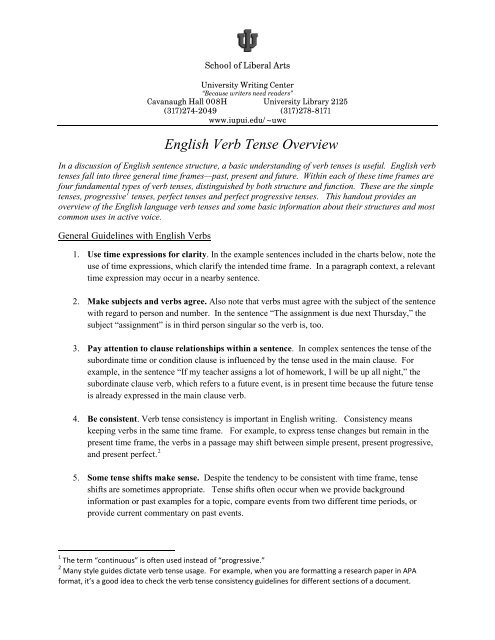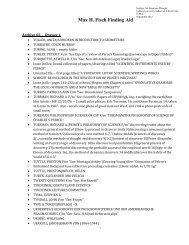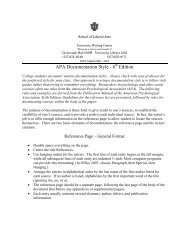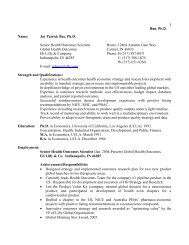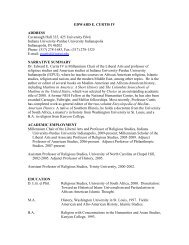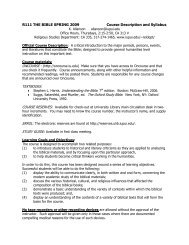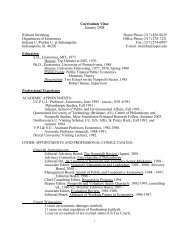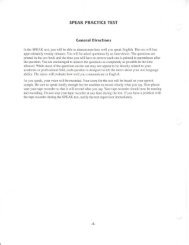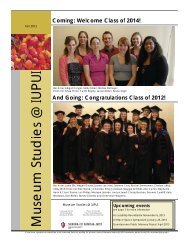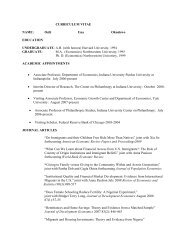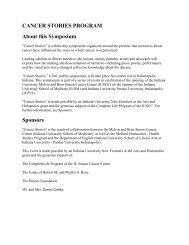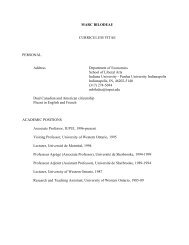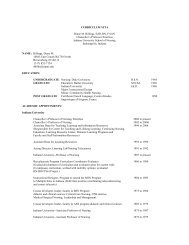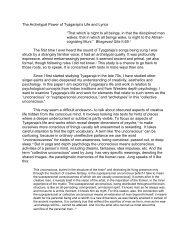English Verb Tense Overview - IU School of Liberal Arts - IUPUI
English Verb Tense Overview - IU School of Liberal Arts - IUPUI
English Verb Tense Overview - IU School of Liberal Arts - IUPUI
You also want an ePaper? Increase the reach of your titles
YUMPU automatically turns print PDFs into web optimized ePapers that Google loves.
<strong>School</strong> <strong>of</strong> <strong>Liberal</strong> <strong>Arts</strong><br />
University Writing Center<br />
“Because writers need readers”<br />
Cavanaugh Hall 008H University Library 2125<br />
(317)274-2049 (317)278-8171<br />
www.iupui.edu/~uwc<br />
<strong>English</strong> <strong>Verb</strong> <strong>Tense</strong> <strong>Overview</strong><br />
In a discussion <strong>of</strong> <strong>English</strong> sentence structure, a basic understanding <strong>of</strong> verb tenses is useful. <strong>English</strong> verb<br />
tenses fall into three general time frames—past, present and future. Within each <strong>of</strong> these time frames are<br />
four fundamental types <strong>of</strong> verb tenses, distinguished by both structure and function. These are the simple<br />
tenses, progressive 1 tenses, perfect tenses and perfect progressive tenses. This handout provides an<br />
overview <strong>of</strong> the <strong>English</strong> language verb tenses and some basic information about their structures and most<br />
common uses in active voice.<br />
General Guidelines with <strong>English</strong> <strong>Verb</strong>s<br />
1. Use time expressions for clarity. In the example sentences included in the charts below, note the<br />
use <strong>of</strong> time expressions, which clarify the intended time frame. In a paragraph context, a relevant<br />
time expression may occur in a nearby sentence.<br />
2. Make subjects and verbs agree. Also note that verbs must agree with the subject <strong>of</strong> the sentence<br />
with regard to person and number. In the sentence “The assignment is due next Thursday,” the<br />
subject “assignment” is in third person singular so the verb is, too.<br />
3. Pay attention to clause relationships within a sentence. In complex sentences the tense <strong>of</strong> the<br />
subordinate time or condition clause is influenced by the tense used in the main clause. For<br />
example, in the sentence “If my teacher assigns a lot <strong>of</strong> homework, I will be up all night,” the<br />
subordinate clause verb, which refers to a future event, is in present time because the future tense<br />
is already expressed in the main clause verb.<br />
4. Be consistent. <strong>Verb</strong> tense consistency is important in <strong>English</strong> writing. Consistency means<br />
keeping verbs in the same time frame. For example, to express tense changes but remain in the<br />
present time frame, the verbs in a passage may shift between simple present, present progressive,<br />
and present perfect. 2<br />
5. Some tense shifts make sense. Despite the tendency to be consistent with time frame, tense<br />
shifts are sometimes appropriate. <strong>Tense</strong> shifts <strong>of</strong>ten occur when we provide background<br />
information or past examples for a topic, compare events from two different time periods, or<br />
provide current commentary on past events.<br />
1 The term “continuous” is <strong>of</strong>ten used instead <strong>of</strong> “progressive.”<br />
2 Many style guides dictate verb tense usage. For example, when you are formatting a research paper in APA<br />
format, it’s a good idea to check the verb tense consistency guidelines for different sections <strong>of</strong> a document.
6. Bending the rules. A verb can sometimes be paired with a time expression to indicate a time<br />
frame other than the one the verb tense normally represents. For example, a present tense verb<br />
can indicate future time when used with an appropriate time expression e.g. “I am planning to do<br />
my homework tomorrow.” This type <strong>of</strong> construction is more frequent in conversation than in<br />
academic writing.<br />
Simple <strong>Tense</strong>s<br />
The simple tenses can be thought <strong>of</strong> as referring to events that are complete wholes. No further<br />
development is anticipated.<br />
Simple Past Simple Present Simple Future<br />
Structures<br />
The past tense form <strong>of</strong> the<br />
verb<br />
The present tense form <strong>of</strong> the<br />
verb<br />
1. will + the simple form <strong>of</strong><br />
the verb<br />
2. BE + going to + the simple<br />
form <strong>of</strong> the verb
1. an action or<br />
situation that began<br />
and ended in the past<br />
1. a future scheduled<br />
event (with a future<br />
time expression)<br />
1. an action or condition that<br />
is expected to occur at<br />
some time or over a period<br />
<strong>of</strong> time in the future<br />
2. an action or situation<br />
that existed usually,<br />
always, or habitually in<br />
2. an action or situation<br />
that exists usually,<br />
always, or habitually<br />
2. an event or situation that is<br />
expected to exist usually,<br />
always, or habitually in the<br />
future<br />
Uses<br />
the past<br />
3. in complex sentences:<br />
an untrue condition<br />
(subordinate clause),<br />
combined with a<br />
‘would’ result (main<br />
clause)<br />
3. a truth or fact<br />
3. in complex sentences: the<br />
result (main clause),<br />
combined with a condition<br />
or time related action<br />
(subordinate clause)<br />
4. in complex sentences:<br />
a condition or timerelated<br />
action (subordi-<br />
nate clause), combined<br />
with a future time<br />
result (main clause)<br />
1. The teacher assigned<br />
two problems last<br />
week.<br />
1. An assignment is due<br />
next Thursday.<br />
1. The teacher will assign<br />
more problems next week.<br />
2. The teacher assigned<br />
problems regularly.<br />
2. The teacher assigns<br />
problems every day.<br />
2. This class is going to<br />
be challenging.<br />
Examples<br />
3. If you did the work,<br />
you<br />
would understand more.<br />
3. There are twenty-four<br />
hours in a day.<br />
3. If/before I hand in my<br />
work, I will check it.<br />
4. If/After I finish the problems,<br />
I will hand them in.
Progressive <strong>Tense</strong>s<br />
The progressive tenses can be thought <strong>of</strong> as referring to events or actions that are “imperfect.” They are<br />
in process or incomplete, and there exists the possibility <strong>of</strong> further development or change.<br />
Past Progressive Present Progressive Future Progressive<br />
a past tense form <strong>of</strong> BE<br />
(was/were) + a present<br />
participle 3<br />
a present tense form <strong>of</strong> BE<br />
(is/are) + a present<br />
participle<br />
1. will be + a present participle<br />
Structures<br />
2. BE (is/are) going to + a<br />
present<br />
participle<br />
1. an action/ condition<br />
already in progress<br />
at a certain time or<br />
occurrence in the<br />
past<br />
1. an action/condition<br />
that is in progress now<br />
1. an action/condition that will<br />
be in progress at a certain<br />
point in time or when another<br />
event occurs in the future<br />
Uses<br />
2. a repeated action in<br />
the past<br />
2. an action in the<br />
extended present that<br />
will eventually end<br />
2. an action that will continue<br />
for<br />
a length <strong>of</strong> time in the future<br />
3. a temporary situation<br />
4. a repeated action<br />
3 Present participles end in –ing e.g. working, studying. Certain verbs (stative verbs such as know, hate and love)<br />
are said to not occur in progressive forms. However, they are <strong>of</strong>ten used in a progressive way, particularly in<br />
conversation, to create an effect, e.g. “I’m loving this music,” thereby turning a state into an event.
1. The teacher was<br />
assigning problems<br />
when the bell rang.<br />
1. The teacher is assigning<br />
problems right now.<br />
1. The teacher will be assigning<br />
problems at the end <strong>of</strong> class.<br />
2. I was studying all<br />
last week.<br />
2. I am studying physics<br />
this semester.<br />
2. The teacher is going to be<br />
assigning work all semester.<br />
Examples<br />
3. I am struggling with<br />
the<br />
homework problems.<br />
4. My physics teacher is<br />
assigning difficult<br />
problems. .<br />
Perfect <strong>Tense</strong>s<br />
The perfect tenses are used to refer back in time to prior events or time periods. They generally refer to<br />
actions that began sometime in the previous time frame and continue up to or into the subsequent one.<br />
Past Perfect Present Perfect Future Perfect<br />
had + a past participle 4 have/has + a past participle 1. will have + a past participle<br />
Structures<br />
2. BE (is/are)+ going to have<br />
+<br />
past participle<br />
4 Past participles generally end in –ed, but may be irregular e.g. worked, studied, eaten, ran.
1. an event or condition<br />
that occurred before<br />
another event or time<br />
in the past<br />
1. an event or situation<br />
that began before now<br />
and continues into the<br />
present<br />
1. a future action or condition<br />
that will be completed<br />
before another event or<br />
time in the future<br />
2. in complex sentences,<br />
an untrue condition<br />
(subordinate clause)<br />
2. a prior action that has<br />
current relevance<br />
Uses<br />
3. a very recently<br />
completed action<br />
4. an action that occurred<br />
over a prior time period<br />
and is completed at the<br />
moment <strong>of</strong> speaking.<br />
5. in complex sentences:<br />
a time related event or<br />
condition (subordinate<br />
clause)
1. She had assigned<br />
assigned several<br />
problems before the<br />
class ended.<br />
2. If I had studied more, I<br />
would have earned an<br />
A.<br />
1. I have been in this class<br />
for two weeks.<br />
2. The teacher has assigned<br />
this chapter already.<br />
1. I will have been studying<br />
Academic Writing for<br />
three<br />
years by the time I<br />
graduate<br />
next spring.<br />
Examples<br />
3. I have just finished<br />
tomorrow’s homework.<br />
4. I have studied the<br />
course<br />
material for three hours.<br />
5. When I have finished<br />
today’s problems, I will<br />
be able to relax.<br />
Perfect Progressive <strong>Tense</strong>s<br />
The perfect progressive tenses combine perfect and progressive meanings. They refer back in time to<br />
prior events and time periods and they have a sense <strong>of</strong> incompleteness.<br />
Past Perfect Present Perfect Future Perfect<br />
Progressive Progressive Progressive<br />
had + been + a present<br />
participle<br />
have/has + been + a present<br />
participle<br />
1. will have + been + a<br />
present<br />
participle<br />
Structures<br />
2. BE (is/are)+ going to have<br />
+<br />
been + present participle
1. an action or habitual<br />
action taking place over<br />
a period <strong>of</strong> time in the<br />
past, prior to some other<br />
event or time.<br />
1. a situation, habit or<br />
action that began in the<br />
past and continues up to<br />
the present (and<br />
possibly into the future)<br />
1. an ongoing or habitual<br />
action that is taking place<br />
in<br />
the present and will continue<br />
into the future until or<br />
into a specific time.<br />
Uses<br />
2. in complex sentences:<br />
a past action in progress<br />
(main clause) that was<br />
interrupted by a more<br />
recent past action<br />
1. The teacher had been<br />
assigning five problems<br />
a day prior to midterms.<br />
1. The teacher has been<br />
meeting with students<br />
in her <strong>of</strong>fice everyday.<br />
1. By the you get here, I will<br />
have been studying for the<br />
final for eight hours.<br />
Examples<br />
2. The teacher had been<br />
planning to have an inclass<br />
exam, but she had<br />
a<br />
take-home exam<br />
instead.<br />
Additional References available in the UWC:<br />
• For grammar exercises on forming/selecting tenses and correcting verb tense errors see the<br />
following:<br />
Grammar Dimensions 4: Forms, Meaning and Use (2 nd ed.) by Jan Frodesen and Janet Eyring<br />
Grammar Troublespots, pp. 41-72, by Ann Raimes<br />
Writing Clearly, An Editing Guide, pp.3-48, by Janet Lane and Ellen Lange<br />
Understanding and Using <strong>English</strong> Grammar by Betty Azar<br />
• For more complex discussions <strong>of</strong> verb tenses, see the following:<br />
The Grammar Book, pp.109-136, by Marianne Celce-Mucia and Diane Larsen-Freeman.<br />
Longman Grammar <strong>of</strong> Spoken and Written <strong>English</strong> by Doulgas Bieber et al.<br />
__________________________<br />
Prepared by Meg Leimkuhler – Updated Spring 2010<br />
SCHOOL OF LIBERAL ARTS<br />
INDIANA UNIVERSITY<br />
University Writing Center<br />
<strong>IU</strong>PUI


